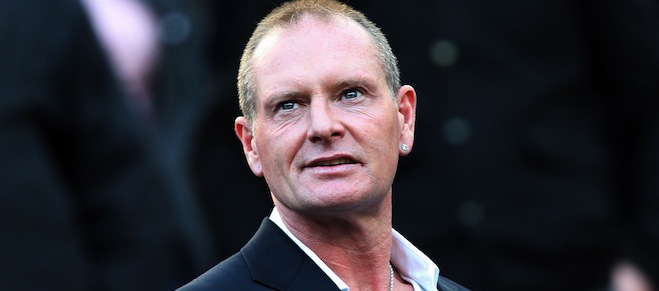It’s not always about tau proteins
Colby Cosh on the slow and public decline of Paul Gascoigne
FILE – In this Sunday, Oct. 16, 2011 file photo, Paul Gascoigne, is seen in the stands ahead of the English Premier League soccer match between Newcastle United and Tottenham Hotspurs at St James’ Park, Newcastle, England. Paul Gascoigne’s appearance at a charity event, with his hands shaking uncontrollably and a stream of swear words tumbling out of his mouth, has sparked renewed fears about the health of one of England’s most talented and popular footballers, with some are even saying his life is in danger. Gordon Taylor, chief executive of the Professional Footballer’s Association, said Monday, Feb. 4, 2013, that “he sounds as if he needs almost a 24-hour watching brief at the moment.” (AP Photo/Scott Heppell, File)
Share

Paul Gascoigne, probably the most beloved English footballer now alive whose name is not found on the roster of the 1966 World Cup side, is in a bad way, according to the UK newspapers. “Gazza” made a horrifying appearance at a hundred-quid charity dinner last weekend, bursting into tears repeatedly after being helped onto the dais and eventually shouting obscenities at the audience. Celebrity friends have since bundled him off to a rehab centre in Arizona, where it is hoped he will tie the proverbial knot at the end of his rope. Unfortunately, it seems the first thing he did when he disembarked the plane was to look for a drink.
Broke, estranged from his family, and visibly ill, Gascoigne appears to be enacting a slow public suicide with resemblances to the fate of Northern Ireland great George Best. But where Best remained happy-go-lucky well into his second liver, Gascoigne gives an impression of constant struggle. He seems to want to get well and has spent long periods sober.
It is a reminder, as contact sports such as football and hockey come under greater scientific and ethical scrutiny, that it can be hard to separate the sinister neurological effects of chronic trauma from the purely psychological effects of having a sporting career come to an end. If Gazza had been a linebacker in American football, people would make bleak jokes about how blows to the head were responsible for his dismal state. Since his game was soccer, it’s hard to assign his condition to anything but the horrors of being philosophically unprepared, or just innately unsuited, for the difficult role of ex-athlete.